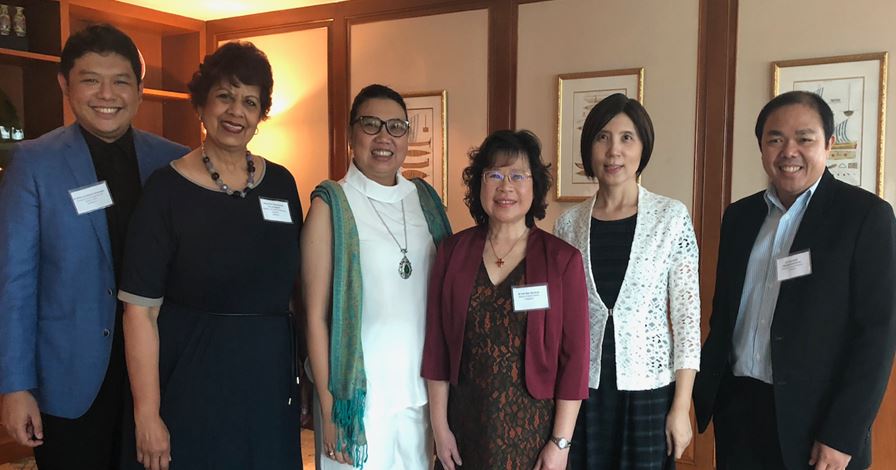WONCA Asia Pacific Roundtables: NCDs and Pain Management
 Photo: NCD Participants included Drs Espina, Murton, Chang, Claramita, Prueksaritanondc, Lee, Jamal, Chang and Wong; Dr Kasuba is not pictured
Photo: NCD Participants included Drs Espina, Murton, Chang, Claramita, Prueksaritanondc, Lee, Jamal, Chang and Wong; Dr Kasuba is not pictured.
We were honored to convene meetings of leaders from WONCA Asia Pacific Region (APR) organizations to explore and reach consensus on reducing unnecessary deaths from non-communicable diseases and on improving treatment of chronic pain. Prof Meng-Chih Lee, President, WONCA APR and Dr Brian Chang, Honorary Secretary, WONCA APR gathered other APR leaders in Singapore December 4-6, 2019. The leaders came from Indonesia, Japan, Malaysia, New Zealand, Taiwan, Thailand, Philippines, and Singapore to share their experiences and plan for the future. Shelly Rodrigues, California Academy of Family Physicians and Mary Ales, Interstate Postgraduate Medical Association, served as facilitators for these meetings and are submitting this summary on behalf of the meeting attendees.
Addressing challenges in health care across the Asia Pacific region requires physicians to share their experiences and develop solutions for the future. Reducing premature death due to non-communicable disease and addressing unnecessary suffering from pain require commitment, creativity and community.
Our aim was to develop recommendations for leadership and education in that address gaps in care through the AP region.
Through ongoing efforts such as those recommended by these discussions, patient-centered care can enhance the health of all individuals.
Addressing Gaps in NCDs through Leadership and Engagement
The Non-Communicable Disease Group reiterated the role of the family doctor in chronic disease management to reduce unnecessary deaths. Their consensus competencies reflect their leadership role in supporting for a population-based approach impacting individuals, public and private entities, communities and other specialists.
The proposed competency themes include:
-Providing patient-centered care that reflects the patient’s bio-psycho-social needs.
-Engaging team-based care in NCD management.
-Engaging communities in caring for their residents and adopting recommended community-based guidelines.
-Obtaining adequate funding for physicians and patients.
-Collaborating with each other and with other leaders to learn together and advocate change.
-Serving as leaders in their communities.
Addressing Gaps in Pain Management through Education
Family doctors and general practitioners need education in all aspects of pain including chronic pain management so they can better support their patients. Education should be integrated throughout the doctor’s career. With better training, family doctors can provide care and work with other providers to coordinate specialty care.
The proposed educational themes include:
-Delivering for patient-centered care through the primary care network
-Patient-centered communication skills including motivational interviewing and teach-back techniques
-Comprehensive management of pain (chronic, cancer, and palliative)
-Preventive pain treatment strategies in managing chronic pain
-Compassionate pain management
-Coordinated, continuous and personalized care
 Pain Management participants included Drs Suwangto, Thuraisingham,
Espina, Rose, Cheng, and Thongkhamcharoen; Dr Garcia called into the
meeting.
Pain Management participants included Drs Suwangto, Thuraisingham,
Espina, Rose, Cheng, and Thongkhamcharoen; Dr Garcia called into the
meeting.
This group also delved deeply into a curriculum for family doctors and general practitioners that would improve the care given to patients with chronic pain. It includes:
-Diagnosis of pain
-Interprofessional communications skills
-Cultural sensitivity
-Patient education and communication, including motivational interviewing and teach-back techniques
-Education for other members of the health care team
-Use of data and analytics
-Quality improvement skills
-Advocacy and leadership training